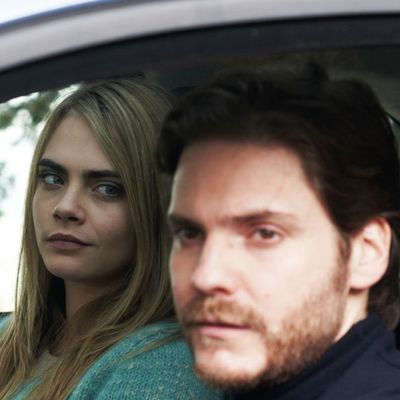
“You can’t tell the truth unless you make it a fiction,” says journalist Simone Ford (Kate Beckinsale) to filmmaker Thomas Lang (Daniel Brühl) in Michael Winterbottom’s The Face of an Angel. Since the film itself is a fictionalized retelling of the events surrounding the Amanda Knox murder trial, we can presume that she’s talking both to the character onscreen and to the audience — trying to justify the movie we’re watching as a necessary reimagining of a real incident about which many people have strong feelings.
The rough outline of the events presented in the film is superficially similar to the 2007 Knox case, which captured the world’s headlines for a few years: A young American student and her Italian boyfriend are accused of brutally killing her flatmate, with a confusing soup of evidence — much of it circumstantial, little of it forensic — gathered by incompetent cops. An opportunistic, click-hungry press fans the flames of suspicion with its selective postings of salacious details from the accused’s life.
By the time Thomas— a n acclaimed filmmaker reeling from the fact that his actress wife has abandoned him for her co-star — arrives on the scene, most people have made up their minds. For his part, Thomas doesn’t care much for true crime, but he needs a comeback after his last flop, and the studio’s interested in this story. The beautiful Simone is but one of the journalists who have flocked to the Italian town of Siena to capitalize on the case. None of these writers seems to work for a foreign bureau; instead, they’re stringers, working for The Daily Beast one week, Time magazine the next, somewhere else the week after that. They have all the cavalier gallows humor of war correspondents, but none of the sense of sacrifice or duty to the truth.
Although there are clear romantic sparks between him and Simone, Thomas opts to avoid the other journalists and to see the real Siena — depicted here as a young tourists’ Gomorrah, its doors glowing red amid its narrow, medieval streets. He enlists the aid of a beautiful film student/bartender, Melanie (Cara Delevingne), who takes him to parties, helps him score drugs, and winds up featuring prominently in his troubling nightmare visions.
This isn’t the first time Winterbottom has explored the boundary between fiction and fact, and the complex interplay of influence. (This, after all, is the man whose adaptation of Tristram Shandy was a comedy about a film production of Tristram Shandy, and whose most recent triumphs were The Trip and The Trip to Italy, pseudo-documentary travelogues featuring Steve Coogan and Rob Brydon playing somewhat made-up versions of themselves.)
One wonders, however, what was on his mind here. As a mystery thriller, The Face of an Angel is a complete nonstarter, mostly by design. Any occasional bursts of tension or suspense have more to do with Thomas’s increasingly damaged mind than anything else — a couple of scenes start out looking like they’re going to offer clues as to the ostensible mystery, but they turn out to be dreams instead. The film does occasionally show a pulse when it tries to reimagine the life of the victim — it turns the tables on the mystery and tries to become a film about love and life instead of doom and death. But it’s too little, too late, and too lame.
The film isn’t much better as a glance at the creative process. Taking meetings with some Hollywood types, Thomas has to contend with all sorts of cliché “notes” about how his film should be: One exec, convinced she’s hit upon the most original of ideas, advises him to make Siena another character in the movie. Winterbottom plays the scene for satire, but then he proceeds … to present Siena as if it’s another character in the movie. Is the director poking fun at himself? The dead-serious tone throughout makes it hard to give him that benefit of a doubt. One suspects that Winterbottom is more interested in exploring Thomas’s twisted mind-set, and how his feelings of sexual jealousy and vengeance make him walk the same (potential) steps of the killer. But his Zalman King–lite dream visions make it hard to take any of this seriously.
Watching The Face of an Angel, I found myself imagining other directors taking a whack at this material. Brian De Palma could certainly go to town on the whole sexual-jealousy thing. Dario Argento in his prime could have chilled us to the bone with the idea of an artist’s obsession with a modern crime drama in a medieval Italian town. Jane Campion could have really pulled off the film’s occasional slides into fantasy, not to mention that late-period attempt to reinvent the narrative as a celebration of the victim’s youthful idealism. The list of directors suited to this material goes on, but I’m afraid it doesn’t include Michael Winterbottom. He’s made great films in his time, but this is one of his most disappointing efforts.





